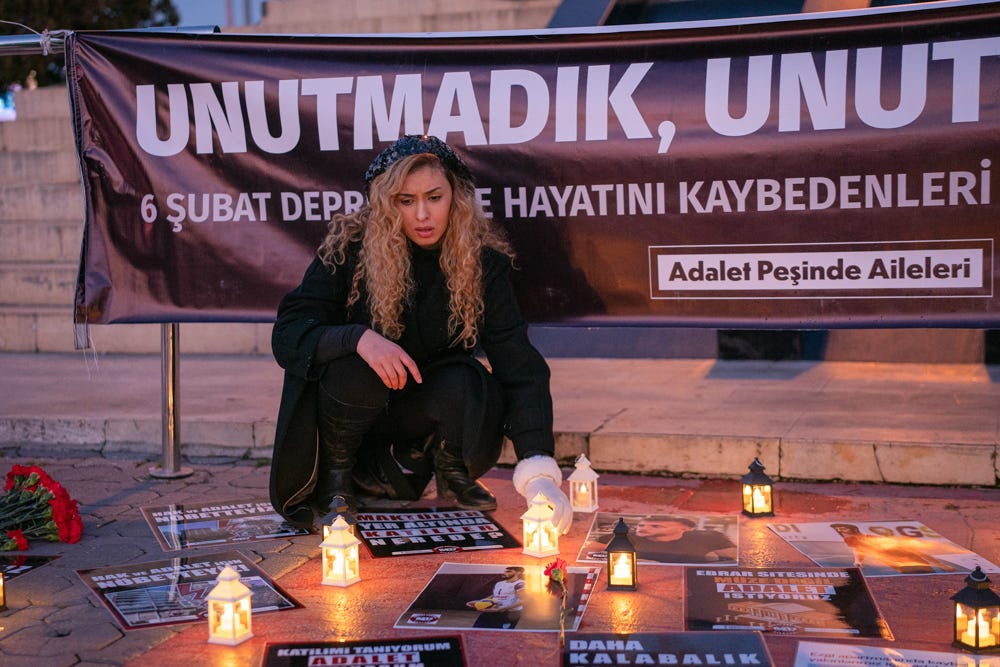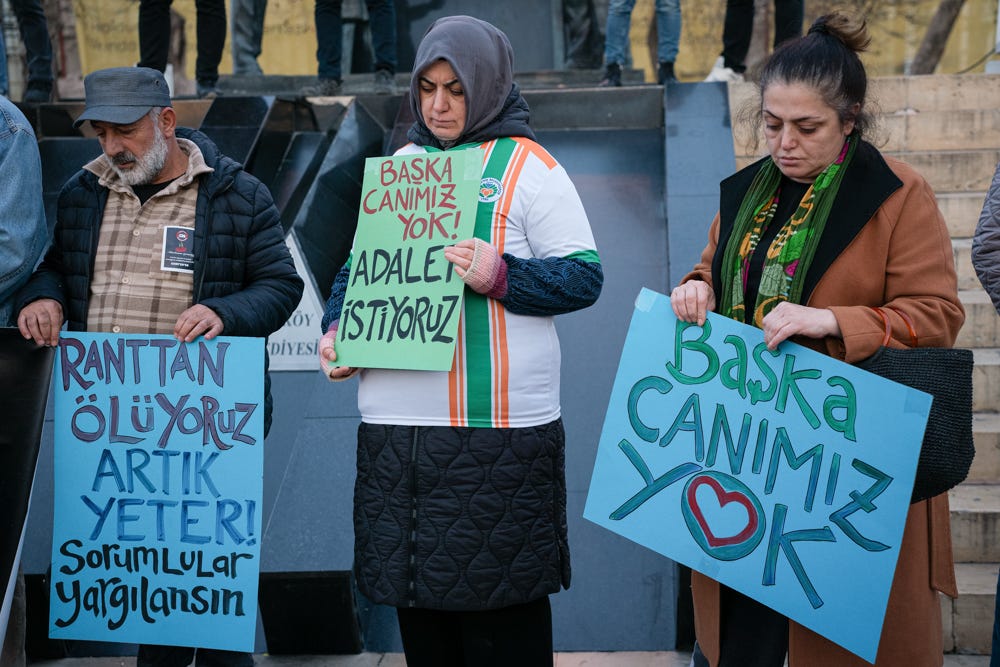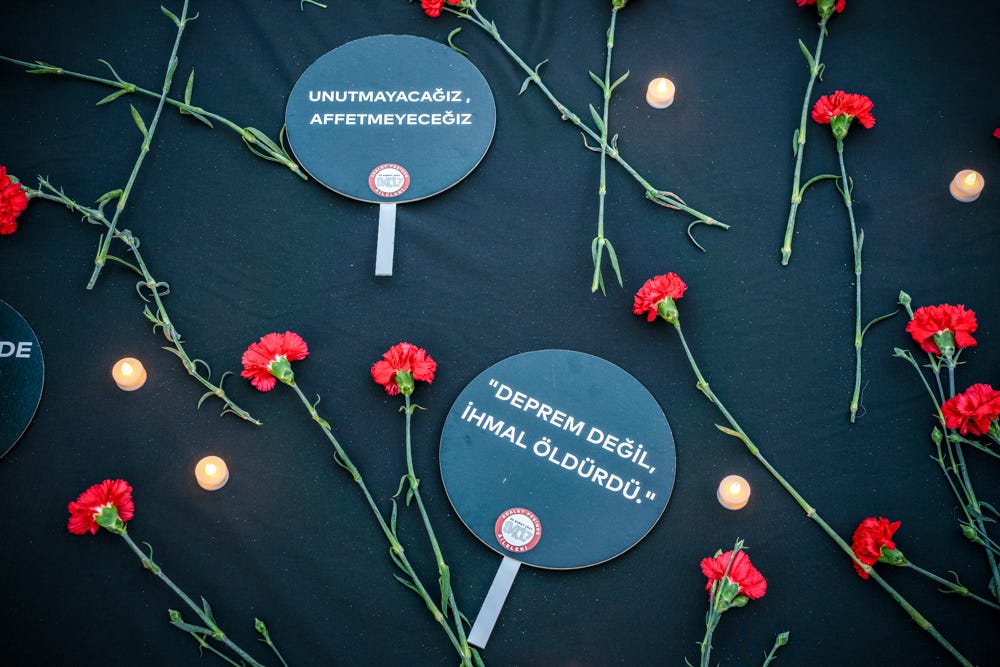
HATAY — Fatma Irmak is a psychologist but hasn’t seen clients for the last two years. Instead, she’s been delving into soil surveys and expert reports, all while attending court cases related to the Ebrar Sitesi, a former apartment complex in Kahramanmaraş.
Her brother died, and her parents were severely injured when their flat in the complex collapsed during the Feb. 6 earthquakes in 2023. The disaster killed more than 53,000 people in Turkey. Ebrar Sitesi alone accounted for 1,400 of those deaths.
Irmak is one of the founders of Families in Pursuit of Justice, a platform for people who lost their loved ones during the earthquake and who are also involved in trials against the contractors, builders and public officials they deem responsible for the death of their relatives.
“I gave my family a promise,” Irmak told Turkey recap last year. “I couldn’t save my brother, so the only thing that is left for me is to get justice for him.”
Irmak’s mission has been a long one. Last week, she said an important step was taken when an investigation was opened against eight public officials involved in the Ebrar Sitesi case.
Holding authorities to account in court is a central focus for the Families in Pursuit of Justice platform as public officers are often left out of earthquake-related prosecutions.
"I feel we made a difference on this aspect," Irmak said.
Still, she believes even with this, their progress has been limited after two years and three hearings. She claimed the “political climate” in Turkey does not allow for fair trials.
"To be honest, I do not think it is a very fair process, and I am not continuing this struggle from a place of hope," Irmak said. "But I am doing what needs to be done. It is a moral responsibility to my family and every citizen in Turkey."
Of the thousands of legal cases linked to the earthquakes, few have sought to determine who was responsible for the lives lost. In the legal procedures, families often advocate for high sentences, while contractors claim they’re being punished unfairly. Though both sides agree that many public officials have, to date, mostly dodged prosecution despite their role in approving and inspecting the buildings in question.
Two years after the earthquake, a limited number of people have been held to account for safety failures such as poor design or inadequate construction of buildings, insufficient regulations and oversight or unscientific zoning permits. The lack of consequences and lengthy judicial processes have, so far, failed to create effective disincentives for the practices behind the mass deaths on Feb. 6, 2023.
Trial of public officials
During the first week of the earthquakes, some of the few positive news stories involved the miracle survivors and the arrests of those responsible for the destruction.
While Turkey’s liability system assigns specific responsibilities to several ministries and municipalities, just a handful of public officers have been involved in legal proceedings in the last two years.
Prosecuting public officers requires a special permit from the Interior Ministry, and to date, few have been given. Human Rights Watch reported the exact number of public officials currently on trial is unknown but cited the Families in Pursuit of Justice calculation that permission has been given to investigate at least 39 of them.
On the other hand, hundreds of technical staff, such as contractors, architects and engineers with different responsibilities in construction are currently in jail, with some claiming the crimes of others were pinned on them.
Increasing frustration
One of the most well-known earthquake cases is the Rönesans Residence in Antakya. The upscale residence became the grave of more than 300 people. At least 50 people are still missing, their bodies never found.
During the most recent hearing in Hatay last month, the main claim of many defendants is that they did everything according to established laws, and that they were being blamed for a crime that was not their responsibility but that of public officials.
"My client did everything required by regulations," lawyer Gizem Yalçın told the court, representing the material inspector of the building. "If there is a fault, it is the fault of those who made insufficient regulations."
One of the relatives attending this trial was Cemile İncili. She was rescued after spending two days under rubble, but the bodies of her sister and niece were never found. She listened to the technical explanations from the defendants, who said they had done their jobs properly.
“I don’t want their condolences,” İncili said. “I just want them to receive the maximum sentence.”
The lawyers representing the families in the Rönesans case blame constructor Mehmet Yalçın Coşkun for not being aware that the soil beneath the complex was inadequate for such a building.
Though Nusret Suna, the head of the Civil Engineers' Chamber in İstanbul, said such framing requires additional nuance.
"If you give zoning permits to the wrong places without conducting proper soil surveys, it doesn't make constructors working with those permits guilty," Suna said.
"There are tens of signatures belonging to public officers when we consider a building's construction,” he continued. “Yet, the government tries to put the whole blame on our colleagues while sparing themselves."
In Kahramanmaraş, the prosecutor started to issue criminal complaints against public officers over the last few months, Mehmet Kaan Kır, President of the Bar Association, told Turkey recap.
“After all, no one goes and constructs a building randomly,” he said. “In order to do this, they need to apply to an office and get a permit. This all needs to come with these individuals being inspected.”
“We want the people who were negligent, who did not inspect the place sufficiently, to be punished equally,” Kır added.
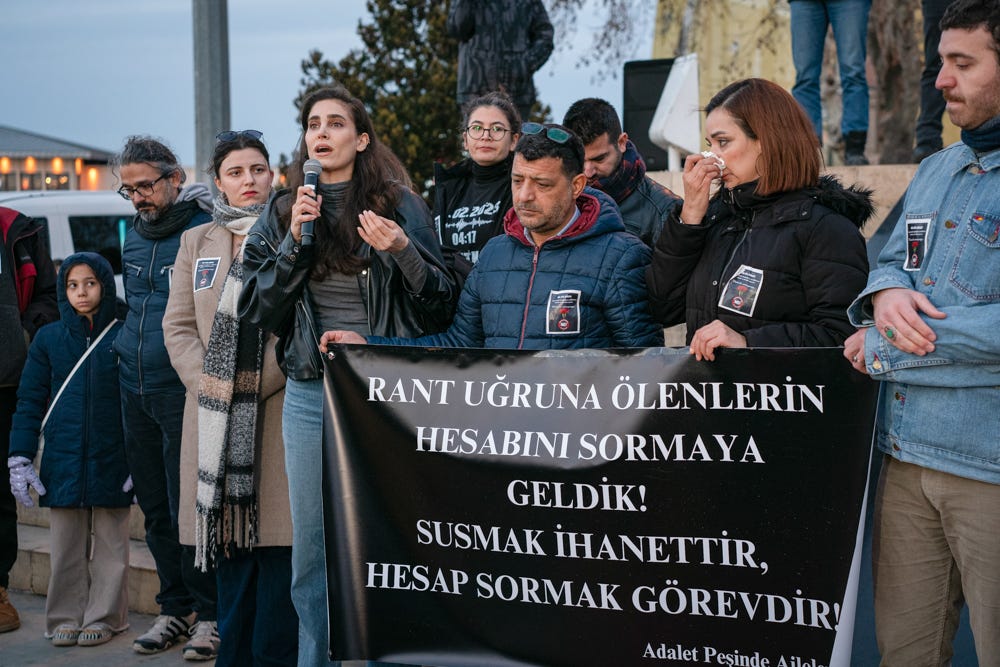
Faulty expert reports
One year ago, Justice Min. Yılmaz Tunç said 369 criminal investigations had started related to building collapses or violations of zoning permits. According to latest Justice Ministry data, the current number of the related public cases is 1,346.
Lawyer Seher Eriş said the Families in Pursuit of Justice platform is following 40 cases. Of those, 26 judicial procedures are ongoing, four cases have reached a verdict and the other trials have yet to start.
Throughout, lawyers and other plaintiffs argue that the legal process is flawed. The first step in these court cases is an expert report examining why a building could have collapsed. Scientists from select universities – most often Karadeniz Teknik University – prepare technical analyses, which form the basis for most court cases.
These reports are the source of many complaints from both defendants and plaintiffs, who deem their analysis insufficient, unreliable and often marked with false information.
Turkey recap analyzed several such reports and found that basic data, such as earthquake acceleration, was incorrect in at least two cases. Technically known as peak ground acceleration, this measures how much the earth shakes at a given geographic point, and in building codes, it’s a crucial element for safety designs.
In two reports, experts completed their evaluations with data collected from another district. Critics suspect some information is copy-pasted due to the high volume of reports some institutions have to produce.
"It is tough to find out why a building collapses," explained Suna, from the Civil Engineers' Chamber. According to him and other experts, an academic study is needed to determine the conditions of each building, which requires more resources than are readily available.
“There may be several wrongdoings in constructing a building, but it is not easy to determine which ones caused the collapse,” Suna told Turkey recap.
“Thousands of cases were sent to the same universities, to academics without experience in those areas. With this workload, they need to complete around ten cases in a day, which is impossible. That's why almost all of the expert reports are problematic,” he added.
Suna stated the chamber was not asked for their help in trials.
Probable intent versus conscious negligence
Another key point is the crime for which defendants are being charged: olası kast or bilinçli taksir. Olası kast translates as probable intent, and bilinçli taksir can be considered conscious negligence.
The question of whether there is intention or negligence results in different jail times. If the convict is negligent, the maximum jail time is 22 years. But if the crime is tied to probable intent, the convict serves life sentences for every victim – or aggravated life sentences if the victim is a woman or child.
Despite lawyers arguing for probable intent, most defendants are charged with conscious negligence instead. Yet, it’s very difficult to prove the difference between the two.
Since Feb. 6, 2023, judges have issued a verdict in 75 earthquake cases, and 130 people were served with various jail terms, which are open to appeals.
Only one contractor has been sentenced for probable intent, which was in the case of the Alpargün Apartment. Ninety-six people lost their lives when the 14-floor building collapsed in Adana. Hasan Alpargün received 62 aggravated life sentences plus 865 years in prison.
Yusuf Sergen Nisanoğlu from the Progressive Lawyers’ Association (ÇHD) is one of the lawyers involved in this court case and represents relatives of the deceased.
“Even the Supreme Court struggles to distinguish probable intent and conscious negligence,” lawyer Nisanoğlu said. “But in summary, if you can predict a bad outcome but do not want that to happen, the law considers it conscious negligence. But if you accept that something bad will happen and don’t do anything to prevent it, it falls under the probable intent.”
The lawyers were among the first people to reach the earthquake zone on the first day. They wanted to help rescue efforts. This allowed them to learn about the faults of the building from day one and meet with eyewitnesses and search-and-rescue teams to strengthen their case.
“No one in the [Alpargün Apartmanı] was found alive,” Nisanoğlu said. “They didn’t get crushed, they were suffocated. We explained to the judges that the constructor knew it would happen but didn’t do anything.”
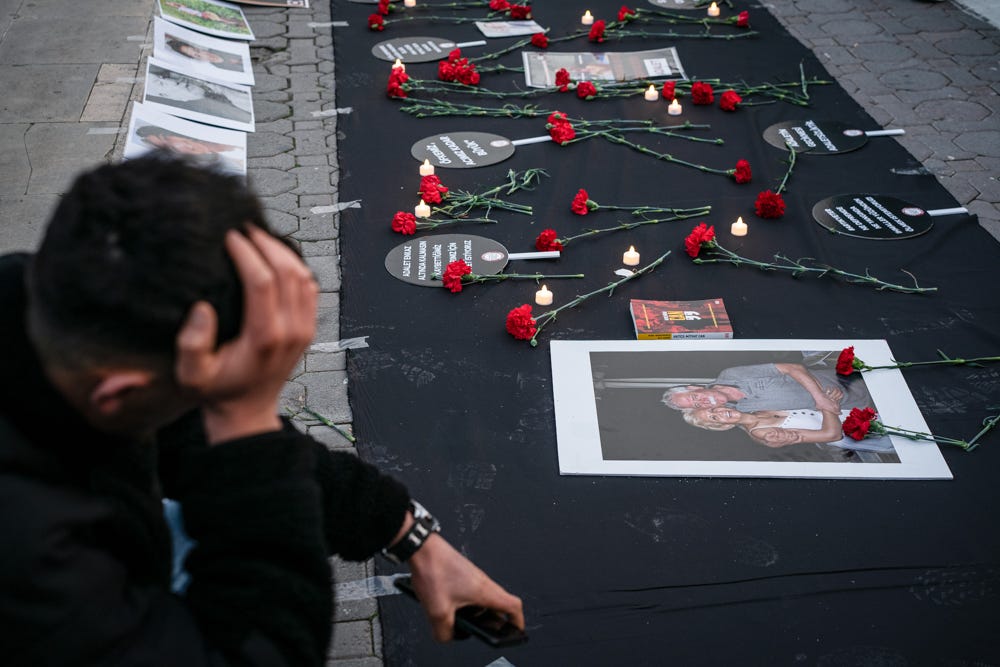
All the responsible parties
Didem Akpınar has difficulties describing what the Alpargün apartment was like. She grew up there, but thinking about the place that became her father's grave still hurts.
“I feel like I've been dead since 6 February,” she told Turkey recap. “Like I am dead and living in another world. I thought it would get easier, but it got much harder.”
She attended one hearing herself, but it was a painful process.
“It’s difficult. To be able to stand up, explain myself to the judge, and listen to the ridiculous defenses of our contractor Hasan Alpargün and their lawyers,” Akpınar said.
As an example, she said the contractor claimed that there was renovation in the apartment, which was ruled to be untrue by the judge.
Although the verdict was good news for her, there is an ongoing appeal process. Families also await a decision about three public officers that were allowed to be persecuted out of the nine sought by a prosecutor.
There is an earthquake risk in Adana, and Akpınar believes every level of government should have taken precautions.
“I want the Ministry of Environment and Urbanization of that period and the Ministry of Environment and Urbanization of this period to be tried,” she said, adding: “And all other local administrators who have responsibilities … In other words, there was no such thing as it being unknown and not being able to take precautions.”
Nusret Suna, from the Civil Engineers' Chamber, also warns that not taking lessons from the disaster will affect all citizens in Turkey.
"We all talk about the possible İstanbul earthquake," he said. "When it happens, that region has a greater building stock than the total of eleven provinces affected by the 2023 earthquakes. If we don't learn from what has happened, we won't be able to overcome the next disaster waiting for us."
During a Sunday evening vigil in early February, Yiğit Göktuğ Torun, who lost his parents and many other relatives in Hatay, echoed a similar belief.
"We won't be able to bring our loved ones back with this demand for justice," he said at an earthquake memorial in İstanbul. "But we want to spare others from the pain we experienced. Disasters won't stop in this country, but maybe we can stop more deaths if precautions are taken."
Turkey recap is an independent, reader-supported newsletter that helps people make sense of the fast-paced Turkey news cycle. Contact us: info@turkeyrecap.com.
Subscribe here on Substack (or on Patreon for a student discount). Paid subscribers get full access to our recaps, reports, members-only chat and news tracking tools.
Turkey recap is produced by our staff’s non-profit association, KMD. We are an affiliate of the Global Forum for Media Development and aim to create balanced news that strengthens local media by supporting journalists in Turkey.
Diego Cupolo, Editor-in-chief
Emily Rice Johnson, Deputy editor
Azra Ceylan, Economy reporter





